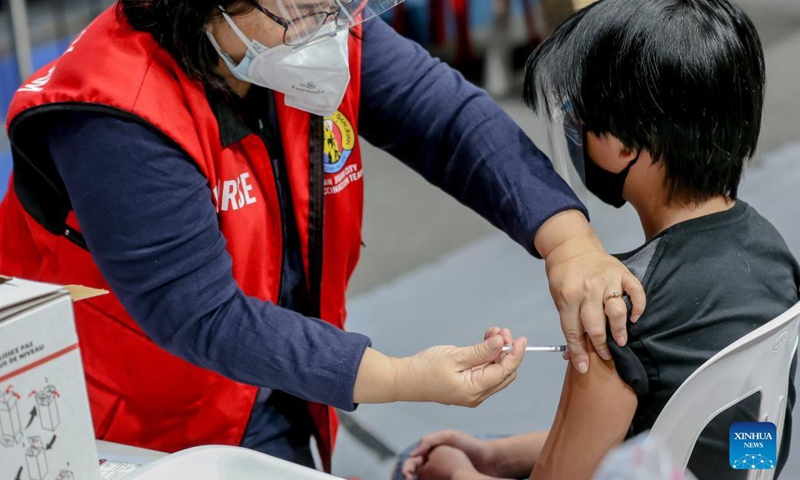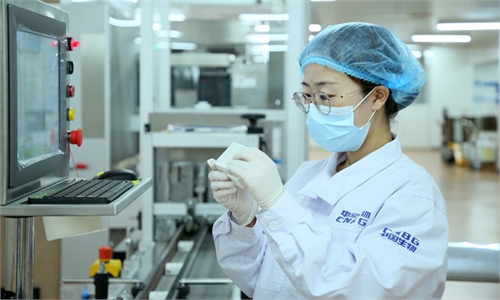China expected to approve country's 1st COVID-19 drug by year-end
Trials show 78% efficacy in reducing hospitalization, death rate

A boy is inoculated with a COVID-19 vaccine at a vaccination site in San Juan City, the Philippines on Nov. 3, 2021. The Philippine government has initiated its national COVID-19 immunization program to children aged 12 to 17 on Wednesday. (Photo: Xinhua)
Chinese researchers are rolling out a number of remedies specific for COVID-19 treatment as the world races into the third phase of the anti-epidemic fight characterized by a combination of accessible vaccines and drugs.
Among drug producers in China, a neutralizing monoclonal antibody combination therapy is expected to become the first in the country to get approval for market use in December. It's also likely to be the first to receive emergency use authorization in developed countries such as the US.
The combination therapy is co-developed by Tsinghua University, the Third People's Hospital of Shenzhen and Brii Biosciences, a company that has dual headquarters in China and the US.
"Human bodies produce a great amount of antibodies, but not all of them have antiviral efficacy. The goal of our research is to pick out the strongest ones that can be used as antibody drugs to treat infected patients," Zhang Linqi, a professor at the School of Medicine at Tsinghua University, was quoted as saying by Science and Technology Daily on Monday.
Tao Lina, an expert on immunology, told the Global Times that the theory of neutralizing antibody-based therapies is to use the antibody in the medicines to neutralize the virus.
They can be used for the treatment of mild to moderate COVID-19 or for post-exposure prevention, according to Tao.
Brii Biosciences announced in late August that its SARS-CoV-2 therapy BRII-196/BRII-198 demonstrated a statistically significant reduction of 78 percent in the hospitalization and death in phase III clinical trials conducted in the US, Brazil, South Africa, Mexico, Argentina and the Philippines.
It is most likely for the therapy to be authorized for emergency use in the US, the Science and Technology Daily report said, citing a source from Brii.
The phase III clinical trials are being led by China's top respiratory expert Zhong Nanshan and being conducted in Guangzhou and Shenzhen, South China's Guangdong Province, as well as Nanjing and Yangzhou, East China's Jiangsu Province, and have delivered exciting results, media reported in August.
It has already been used among more than 700 patients infected in the recent epidemic flare-ups in China, caused by the Delta variant in Shenzhen, Ruili, Nanjing, Putian and Heihe.
The therapy has also proven effective against major coronavirus variants, including the Delta, Lambda and MU variants, the Beijing Daily reported.
The R&D team of the drug submitted application to the National Medical Products Administration on October 9 and is expected to be approved for marketing by the end of December.
The company has invested $100 million to get the drug ready for marketing in China, the US and other countries, Brii Biosciences' Chief Financial Officer announced in September. It has applied to the US Food and Drug Administration for emergency use authorization.
By far, China has deployed three technical routes in developing COVID-specific drugs - blocking virus entry into cells, inhibiting virus replication and adjusting the human immune system. The three approaches have their respective advantages and strategies in dealing with the coronavirus.
Zhang Yuntao, a vice president and chief scientist of Sinopharm subsidiary China National Biotec Group, previously told the Global Times that the group's COVID-19 drug based on human immunoglobulin would soon be put into a clinical trial in the United Arab Emirates.
The drug has already been used in recent flare-ups across China and it has proved to have a good therapeutic effect. Another medicine of the group based on monoclonal antibodies has also showed good neutralizing effects on the COVID-19 virus in experiments and is undergoing the procedure to obtain clinical trial approval from the Chinese authorities, according to Zhang.
Kintor, a clinical-stage biotechnology company, also reportedly obtained approval in September for two phase III clinical trial projects on its small-molecule compound drug Pukru amine with Chinese authorities. The two projects would be conducted in various countries and regions including China, the US, India and Europe.
Zeng Guang, former Chief Epidemiologist of the Chinese Center for Disease Control and Prevention, noted that currently countries are passing through the second phase of the epidemic prevention and control and are entering the third phase, where other measures need to be combined with vaccination, the 21st Century Business Herald reported in November 8.
Commenting on those who hold the opinion that vaccines are no longer needed once the COVID-19 drugs are rolled out, medical experts warned that it is "a dangerous misconception." Either in preventing infection or in reducing the rate of severe symptoms or death, there are no substitutes for vaccines. "Therapeutic drugs and vaccines are not conflicting but complementary," said Ding Sheng, dean of the School of Pharmacy at Tsinghua University.

